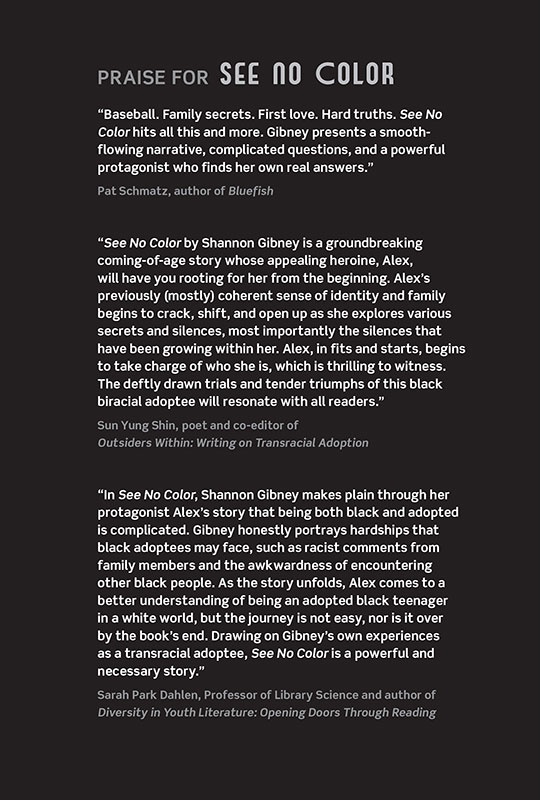See No Color
Authors: Shannon Gibney




Text copyright © 2015 by Shannon Gibney
Carolrhoda Lab⢠is a trademark of Lerner Publishing Group, Inc.
All rights reserved. International copyright secured. No part of this book may be reproduced, stored in a retrieval system, or transmitted in any form or by any meansâelectronic, mechanical, photocopying, recording, or otherwiseâwithout the prior written permission of Lerner Publishing Group, Inc., except for the inclusion of brief quotations in an acknowledged review.
Carolrhoda Labâ¢
An imprint of Carolrhoda Books
A division of Lerner Publishing Group, Inc.
241 First Avenue North
Minneapolis, MN 55401 USA
For reading levels and more information, look up this title at
www.lernerbooks.com
.
The images in this book are used with the permission of: © Image Source/SuperStock (woman); © iStockphoto.com/DS011 (baseball); © Photoroller/Dreamstime.com (line in dirt).
Main body text set in Janson Text LT Std 10/14.
Typeface provided by Linotype AG.
Library of Congress Cataloging-in-Publication Data
Gibney, Shannon.
See no color / by Shannon Gibney.
pages cm
Summary: Alex has always identified herself as a baseball player, the daughter of a winning coach, but when she realizes that is not enough she begins to come to terms with her adoption and her race.
ISBN 978-1-4677-7682-0 (lb : alk. paper) â ISBN 978-1-4677-8814-4 (eb pdf )
[1. IdentityâFiction. 2. BaseballâFiction. 3. AdoptionâFiction. 4. African AmericansâFiction. 5. Self-acceptanceâFiction. 6. Family lifeâFiction.] I. Title.
PZ7.1.G5See 2015
[Fic]âdc23
2015001619
Manufactured in the United States of America
1 â BP â 7/15/15
eISBN: 978-1-46778-814-4 (pdf)
eISBN: 978-1-46778-980-6 (ePub)
eISBN: 978-1-46778-979-0 (mobi)
FOR
THE
OTHERS
“That was the miscast summer of my barren youth which (for that short time, that short brief unreturning springtime of the female heart) I lived out not as a woman, a girl, but rather as the man which I perhaps should have been.”
âWilliam Faulkner,
Absalom, Absalom!

PROLOGUE
I
am six, safe on his lap. A scorecard on the table, pencil falling out of my hand.
Write the names of your teammates here
, he says, moving my hand slowly left to right,
A
s and
N
s and
E
s smushed together slowly into words. Like magic.
One page for your team, one page for the other.
I nod, because I know what he wants. Not because I am listening right.
You record what happens at each at bat on your scorecard.
He scratches my head, how I like it.
Little Kirtridge.
I laugh. He makes a line from the circle past the square and asks me why he did that. I don't know. I don't know. But he needs some words from me. Now.
That's what happens,
I say.
That's what you put down.
He laughs, even though that is not all the way it works. I want to color in the circle and square, but more I want words from him. So, I put my head on his shoulder, while more words come, and he moves my pencil all around the paper.
You have to keep score in order to win,
he says.
That is what all this adds up to, see?
I close my eyes, and the dreams are almost coming now, with the words. His arms, all blankets, warm me.

CHAPTER ONE
“G
o tell Dad we got to get going,” Jason commanded. He might have been only a year younger, but these days, he wasn't trying to act like it. I didn't like taking orders from my little brother but decided to leave it alone. I figured he had his hands full trying to negotiate Dad's disappointment, and avoidance was his newest strategy.
Like me, Jason would do anything to avoid
the look
âthe stern and disapproving glance Dad gave us whenever we had done wrong in the game.
When you don't play your best, you don't just hurt yourself. You hurt me.
His eyebrows would knit together, his lips even tighter than usual and he would emit this kind of energy from his eyes that could scald. I knew that Jason didn't want to see last week's game and his lackluster performance reflected in Dad's eyes.
I shrugged and stared into my copy of
The Scarlet Letter
. “We've still got two hours before first pitch.” West High, which Dad had been coaching for seven years, was hoping to make it to the state tournament.
Jason glared at me, pressing his right arm into the wall. “Alex, you know how he gets when he doesn't have enough time to do the whole warm-up.”
I remembered the game last year when I couldn't find a tampon or pad in the entire house and we had to stop at Walgreen's. We still got to the game very early, but Dad's face was pinched for the next day and half. He was so irritated with me. And plus, my game was just
off
for seven long innings. No, Jason was rightâI definitely didn't want to go through that again, especially before such an important game. If I had to do my homework reading later tonight and postpone
The Walking Dead
graphic novels I'd set aside as a reward, then so be it. I stood up, reluctantly, and then pushed in my chair. “Where is he?”
Jason turned around and began stretching his other arm. “He's down in the den, messing around with some of his files or something.”
I rolled my eyes and started walking down the long, French-tiled hallway. Dad spent hours in that den, doing God knows what. Pouring over various files, reading all his special baseball analytics newsletters, watching, cutting, and reordering video clips of our games, and most of all, checking and adding to his ever-growing battery of stats and metrics. Walking in there was like walking inside his brain; it was too intense and almost creepy.
I rounded the corner and started down the steps to the den. The cool stone against my bare feet sent shivers up my spine, and my hands grabbed my elbows. A full color print-out of last season's metrics for both Jason and me was plastered across the right-side wall, lest either of usâor worse, Dadâcommitted the deadly sin of forgetting. I read the slash lines again, involuntarily:
ALEX: .311/.403/.561
JASON: .287/.377/.539
Batting average/on-base percentage/slugging percentageâthree numbers that managed to be us. When I looked up, I spotted Dad, leaning over his big, gray filing cabinet, rifling through its folders. His brow was furrowed in concentration as he lifted one of them up and paged through its contents slowly and methodically. I leaned against the wall, still not in plain sight, but not really hidden either. I was relieved for some reason that he hadn't noticed me, even though I had come here to get his attention, to tell him that we needed to go.
He pulled out an envelope that looked very worn and tattered and quite old. He ran his fingers over it gently, like he was reading braille. I don't think I had ever seen my father handle something so carefully, and I wondered what it was. He bit his lip and then sighed. After a moment, he pulled out a letter and opened it slowly, smoothing out the folds. He was holding it at such an angle that I could not read it, but I could have made out the handwriting if I recognized it. I craned my neck out, curiosity trumping fear.
“Time to go?” His head had snapped around so quickly that I was hearing the words before seeing his eyes.
I jumped. “Yes!” I said, too brightly. “It's twelve thirty.” I shoved my hands into my pockets.
He smiled, crammed the letter and envelope back into the folder, and slammed the cabinet closed. I jumped again at the sound.
“Sorry, honey,” Dad said, walking briskly to his chair to get his coat. “Just got caught up.” His shoulders looked a little tight, but the rest of his body looked loose, so I hoped I was off the hook. He didn't seem angry.
He strode over to me and put his arm around my shoulder. “Shall we?”
I nodded, willing myself to lean into him, to make his embrace comfortable. Then we began to walk back toward the kitchen, in a kind of awkward silence. I wanted to ask him so many things. But before I could even fathom opening my mouth, we were in the kitchen, facing Jason, who was sprawled out on the floor in the runner's stretch. “Time to go out and get a win,” Dad said, clapping his hands. Jason's shoulders hunched, and he kind of shivered in surprise at the sharpness of the sound, almost like Dad was waking him up or something. He looked up at him and nodded grimly.
CHAPTER TWO
I
t was a cool late March day, with just a little bit of dew on the ground, and green just beginning to push through the hard soil. A few family and friends dotted the bleachers surrounding the field, arranging their coolers and jackets and seat-rests. I closed my eyes and inhaled deeply, trying to take it all in, and prepare myself for the first step toward winning the state tournament and, at the same time, a place on the elite club team this summer and fall. When I opened my eyes, I saw Dad walking out to meet the other coach on the pitcher's mound. The game was against East, our crosstown rivals. The rest of us gathered as close as we dared, throwing and catching and warming up, but really just trying to listen. Dad was famous for trying to get in the heads of his rival managers.
